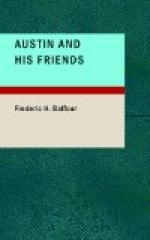“Not a bit of it,” said Austin hastily, as he swung himself out of the room. “I shall be back in time for dinner.”
“He certainly is the very oddest boy,” soliloquised Aunt Charlotte, as she settled herself comfortably on the sofa and went on clicking her knitting-needles. “Why he dislikes the MacTavishes so I can’t imagine; nice, cheerful young persons as anyone would wish to see. It really is very queer. And then the way he suddenly gave in at last! It only shows that I must be firm with him. As soon as he saw I was in earnest he yielded at once. He’s got a sweet nature, but he requires a firm hand. He’s different, too, since he lost his leg—more full of fancies, it seems to me, and a great deal too much wrapped up in those books of his. I suppose that when one’s body is defective, one’s mind feels the effects of it. I shall have to keep him up to the mark, and see that he has plenty of cheerful society. Nothing like nice companions for maintaining the brain in order.”
Thus did Aunt Charlotte decide to her own satisfaction what she thought would be best for Austin.
Chapter the Third
He stood leaning against the old stone fountain on the straight lawn under the noonday sun. The bees hummed slumberously around him, sailing from flower to flower, and the hot air, laden with the scents of the soil, seemed to penetrate his body at every pore, infusing a sense of vitality into him which pulsed through all his veins. Austin always said that high noon was the supreme moment of the day. To some folks the most beautiful time was dawn, to others sunset, but at noon Nature was like a flower at its full, a flower in the very zenith of its strength and glory. He had always loved the noon.
“The world seems literally palpitating with life,” he thought, as he rested his arm on the rim of the time-worn fountain. “I’m sure it’s conscious, in some way or other. How it must enjoy itself! Look at the trees; so strong, and calm, and splendid. They know well enough how strong they are, and when there’s a storm that tries to blow them down, how they do revel in battling with it! And then the hot air, embracing the earth so voluptuously—playing with the slender plants, and caressing the upstanding flowers. They stand up because they want to be caressed, the amorous creatures. How wonderful it is—the different characters that flowers have. Some are shrill and fierce and passionate, while others are meek and sly, and pretend to shrink when they are even noticed. Some are wicked—shamelessly, insolently, magnificently wicked—like those scarlet anthuriums, with their curling yellow tongues. That flower is the very incarnation of sin; no, not incarnation—what’s the word? I can’t think, but it doesn’t matter. Incarnation will do, for the thing is exactly like recalcitrant human flesh. Lubin!”
“Yes, Sir?” responded Lubin, who was digging near.




